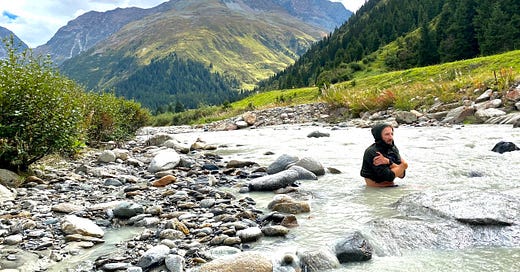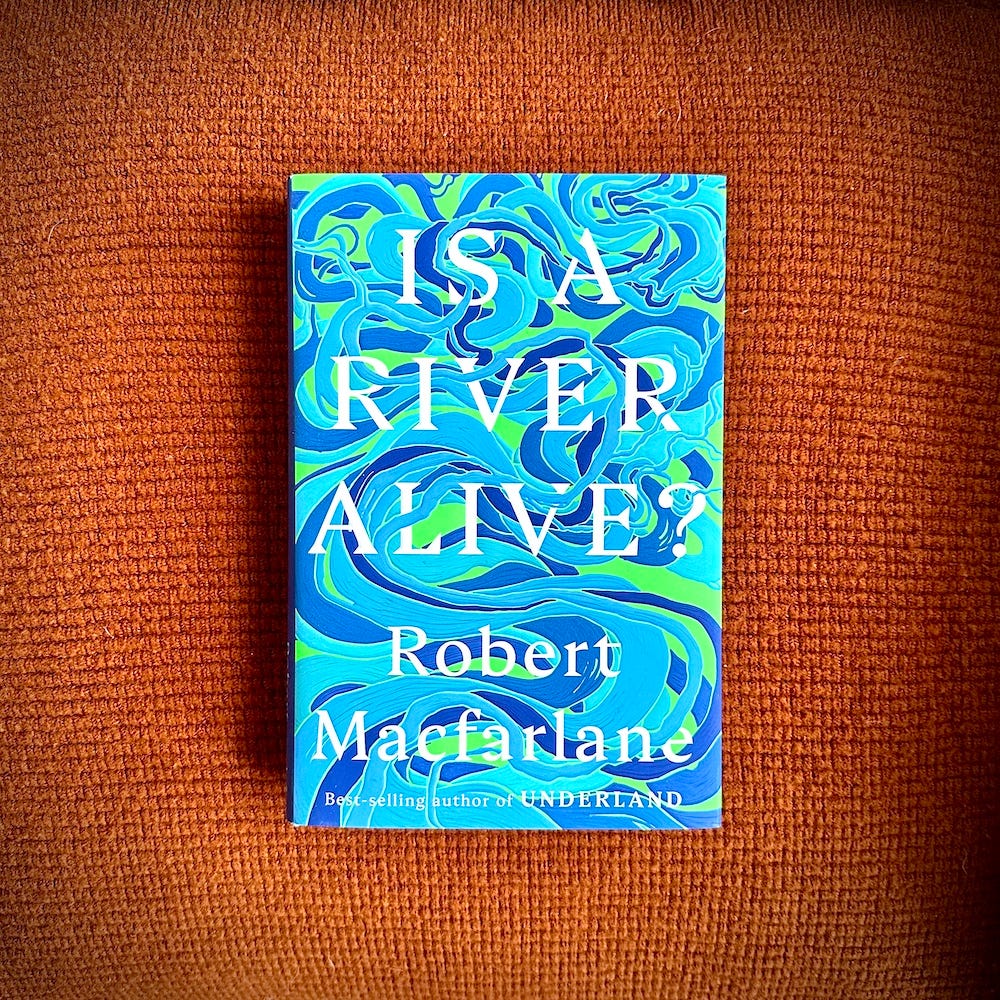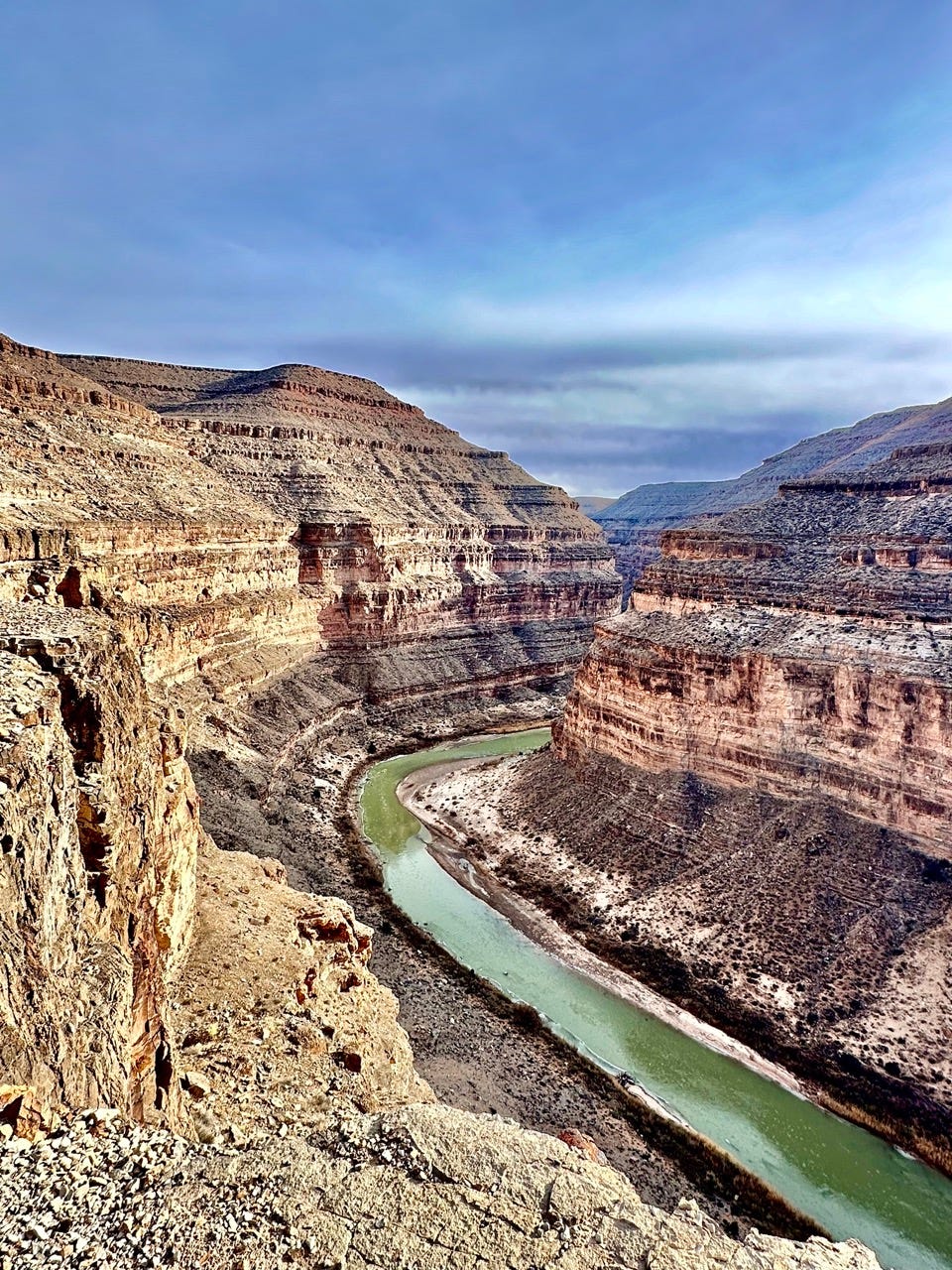Maps are so often a tool to get us someplace.
But what if maps and immersion and travel weren’t all moving us toward destinations, but, rather, invitations for a body scan, for listening to what elements say in a landscape of language all their own?
Diffuse, mysterious, anarchic—we quiet to follow their whispers.
The author Robert Macfarlane seems to be on a lifelong quest to understand what it means to listen and be taken by the living world, which has taken him to the tops of mountains, along ancient pathways, and deep into remote wild places.
He’s peered into the subtle kinetics of language itself, taking seriously Robin Wall Kimmerer’s “grammar of animacy” by turning over every stone through illustration and song, through palling with Sheldrakes and Donwoods and subversive punk-weirdos who see and hear and express differently. His academic side longs to see the world slant like his comrades, and he absolutely succeeds—muddy boots outside during office hours.
In his latest book, he’s come to ask: Is a river indeed alive?
The author’s question turns the whole seeker-discoverer-colonial-horizon-hungry-vaulter-prospector-of-riches enterprise on its head because, what a river teaches him, after following three to either source or terminus—cloud forest headwater, toxic ghost river, remote wild river—is that these rivers are alive so much as the rest of the field of relations that depend on them are alive. And this vitality lives not only within each destination of a self, but in the intertidal, meshy, mycelial mosh pit of spaces between nodal bodies.
This, I think, is the existential corrective Macfarlane aims for that I’m most excited about: to see with new-old eyes, not through some VR headset, not with some nostalgic primitivist axe to grind, but rather to embody the seer as a co-creator of epiphany, to be seen and to be thought by the river, the mountain, the dripping underland, sea-trails vaporizing in the mist.
It’s clear that each river begins to coauthor the book, and by the end, which is also itself a kind of beginning, where, I wonder, might Macfarlane go next, after finding himself having gone up and down and around in his corpus of work, coming to an intellectual and creative wellspring that appears as everything, everywhere, all at once?
“You are not unlovable,” says Evelyn Wang in the 2022 movie of the same name. “There is always something to love. Even in a stupid, stupid universe where we have hot dogs for fingers, we get very good with our feet.”
Maybe where Macfarlane’s feet and mind have guided him, and us, for over two decades of book-writing, is that this is, in fact, the most existential fear of all. What if there really is nowhere else to go? (The great Beat poet, Lew Welch writes: “This is the last place. There is nowhere else to go.”)
Maybe all we have is to listen to is our body being fully enrobed by this question—this questing, this seething and surprising world—from all sides, from within and without, that to feel its pulse is to feel our own completeness draped in such unintellectualized, unabstracted immediate reciprocity.
Relish in this now! I imagine the author scribbling rabidly into one of his scruffed up Field Notes booklets.
Defend and steward now!
Get out of your head and into river-consciousness-body now!
Now and now and now.
I imagine this because my notebooks, too, are sick of my overthinking self, my disembodied praxis, how I’ve too often attended to a place, a river, a self as more a project for me alone to shape than for the landscape to shape through me.
But Macfarlane somehow finds his way into the core of this tension with such grace, and through to a shimmering world, an inscendence rather than transcendence into the world’s anarchic patterning, one of deep field relationality and distributed animacy composed of the particular and the miraculous, a whole flowing, gushing, throbbing current—tidal charts of elemental awakening.
To offer a river a seat at the legal table, then, amid nation-state governance and political boundaries, indeed provides a Rubix cube of a challenge, for how enchanting can legalese be, even though it, too, is alive?
From what I understand in Is a River Alive?, establishing that a river deserves their own sovereign rights requires us to extend the field of relations to all that depends on the river, which is, well, everything.
And quickly, this web of interbeing siphons into a one-dimensional nation-state courtrooms, a matrix of power and bureaucracy that doesn’t often play very well in multidimensional sandboxes of ecology and unquantifiables. Statehood persists on exclusion, on differentiation, summoning what David Graeber in The Dawn of Everything sites as “schizmogenesis.”
It’s this hierarchy of mind that might be our fatal flaw, but Macfarlane champions through sumptuous and precise prose an enduring river of mind that sees rivers as currents of sentience that implicate us all—that to protect a river is to protect an unmappable web of shared memory.
Clearcut the riparian zone, dam the river, pave over and drain the flow and a vast skin of memory of relational durability flakes away. The reflection and echo back to the disenchanted human then becomes reified as one of utility, one-dimensional and anthropocentric.
On the other hand, though, to experience our creature as itself a river, a body amid myriad bodies all flowing through me is for us to join in the water’s perfect memory.
In a recent piece I published in Emergence—for which I need to credit Macfarlane’s thinking that guided me in many ways—I included a quote from Toni Morrison during a talk at the New York Public Library nearly forty years ago, in 1986. Here it is, in full:
“You know, they straightened out the Mississippi River in places, to make room for houses and livable acreage. Occasionally the river floods these places. ‘Floods’ is the word they use, but in fact it is not flooding; it is remembering. Remembering where it used to be. All water has a perfect memory and is forever trying to get back to where it was. Writers are like that: remembering where we were, that valley we ran through, what the banks were like, the light that was there and the route back to our original place. It is emotional memory—what the nerves and the skin remember as well as how it appeared. And a rush of imagination is our ‘flooding.’”
Find this book in your watershed’s local indie or online. Let it flood you. It’s required reading during these most interesting times.
I’ll end with my 200-word “micro-distillation” on the Mandorla 200:
A river rivers, just as you river. Throb and swerve with the milk of the world. Plunge-descend beneath all surface charades. Hold your breath and let it burn and know that this fluid breathes you alive, coauthoring some autobiography where source, self, and confluence meet at once, a remembering of the whole through porosity, through kinship, obscuring self into an “ecology of selves,” while hedging against the industrialized imagination, our creativity otherwise dimmed as puckered, half-dead units. Here is the warrior call: imagine with a river. Surrender to its blood-gush slosh into the heart of the world and let it guide you downstream and upstream and allstream, funneling toward oceanic still. But know this: river song isn’t forever song. They are dying, muted by unreliable maps pouring concrete to obscure the source. Imperial maps misunderstand that rivers are gods, that they ask now for our ears and tongues and fists. This is no intellectual exercise; hydrocurrency only currents between bodies. And our bodies tilt toward water because we, too, are water, longing for ourselves. Now: listen to the river’s enduring song. Attune to its indwelling animacy. Feel the plunder. Let it drown you. And then, from this ferocious love, this pose of riparian guardianship—flow."







Wonderful, Nick, just wonderful. Now I'm even more exited to read RM's new book. And this - "I imagine this because my notebooks, too, are sick of my overthinking self, my disembodied praxis, how I’ve too often attended to a place, a river, a self as more a project for me alone to shape than for the landscape to shape through me." - beautiful.
I'm reading this now. Yes!